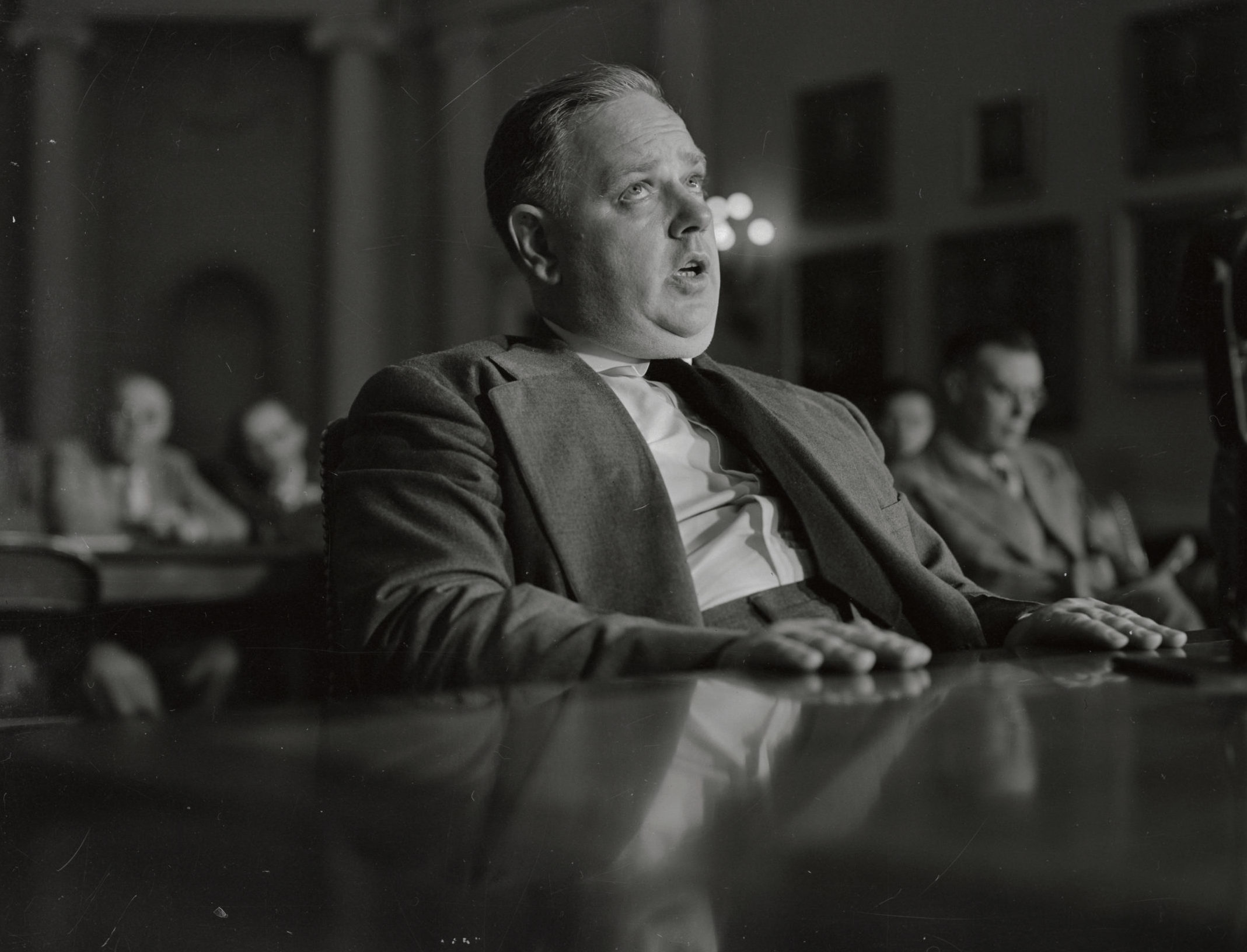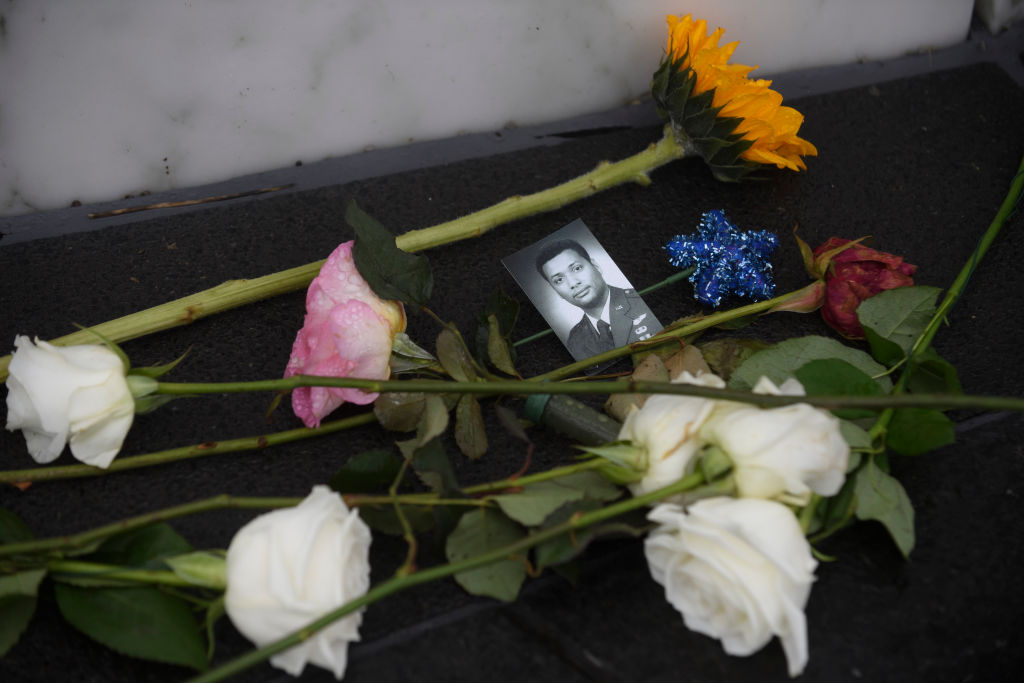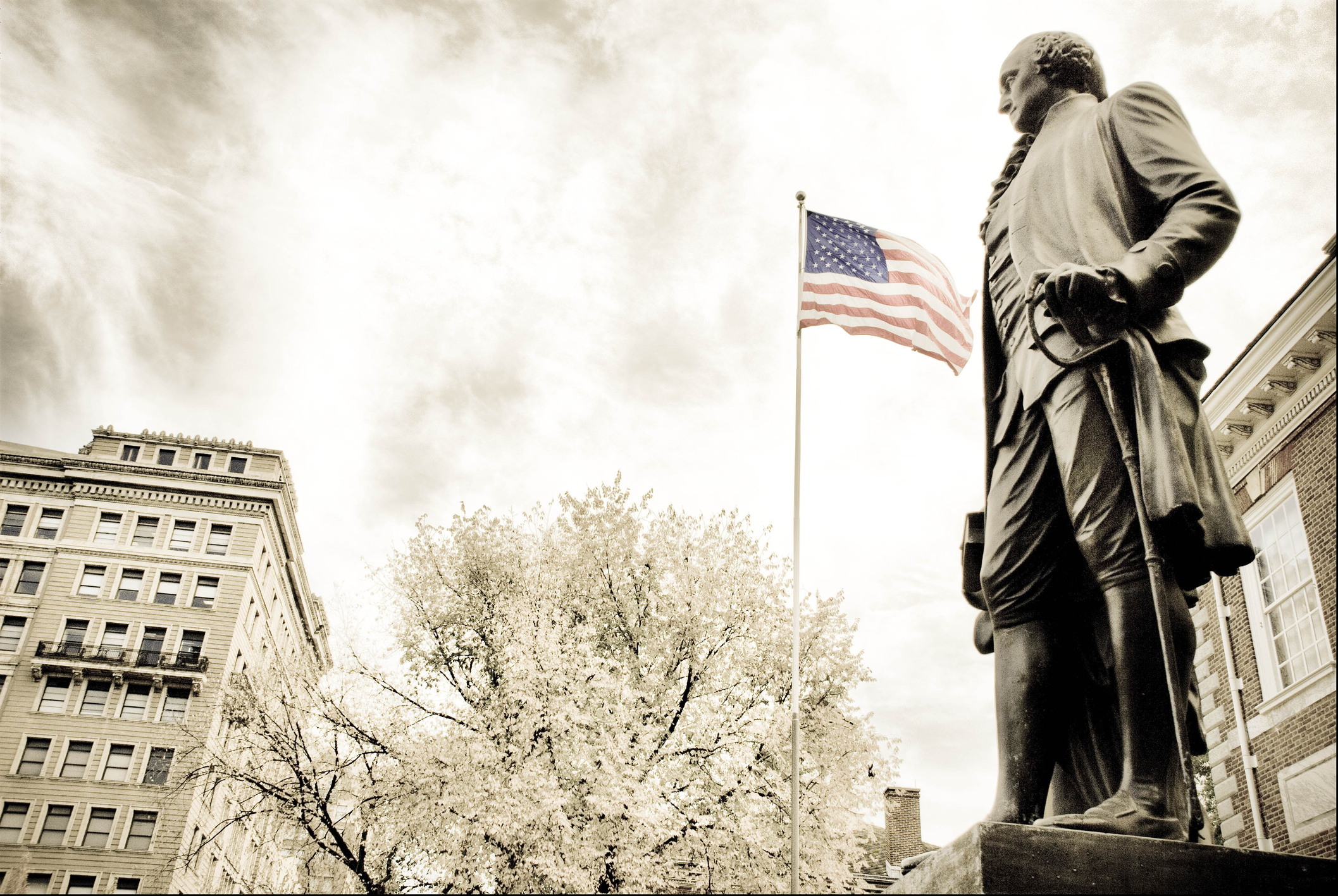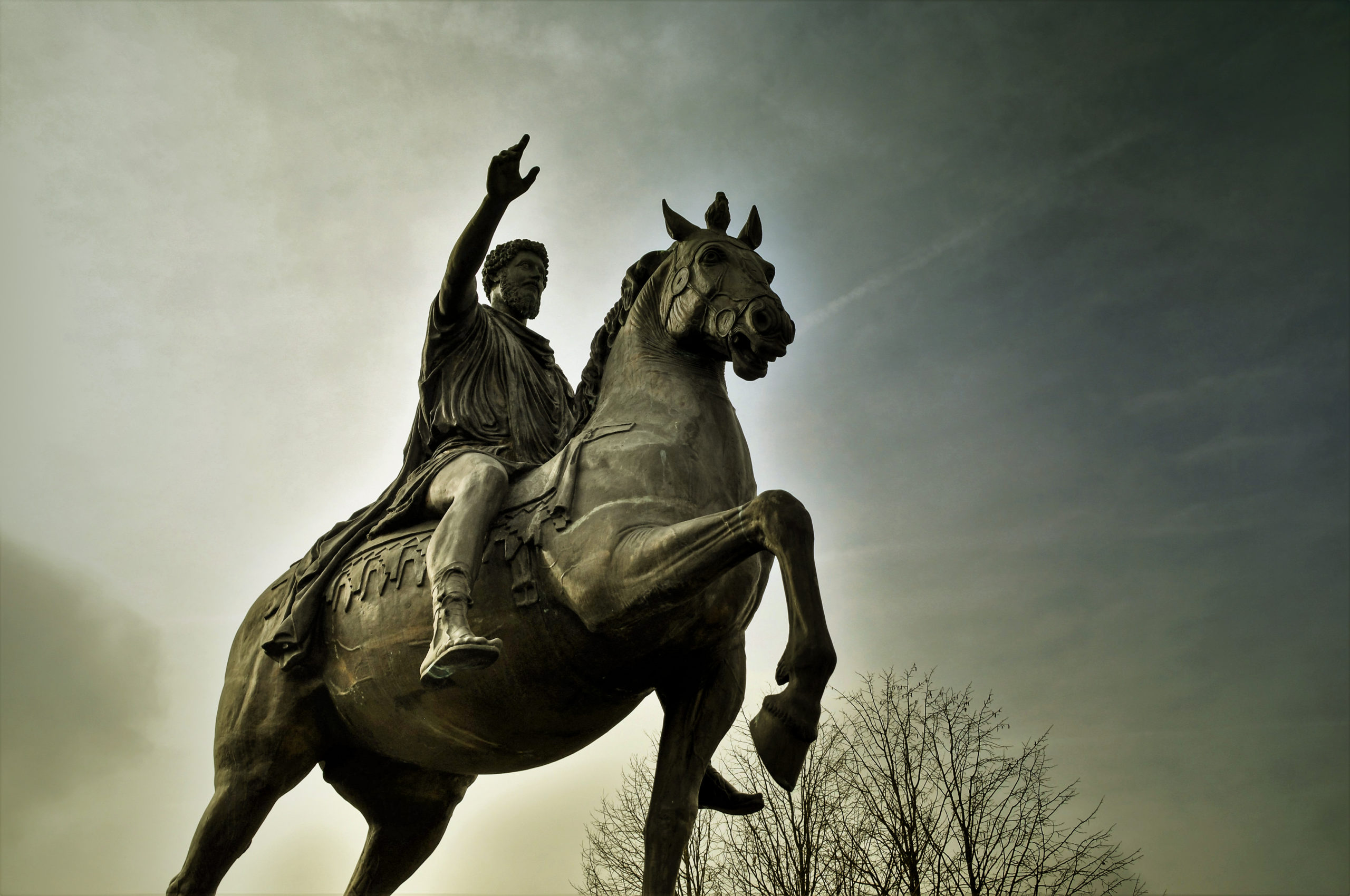Rage meets self-pity as the permanently offended root out false thought.
Witness to a Crisis

The spiritual testimony of Whittaker Chambers holds up after seventy years.
Whittaker Chambers remains one of the great witnesses to the moral, political, cultural, and spiritual crisis that spanned the “short twentieth century,” beginning with the “guns of August” in 1914 and ending with the annus mirabilis of 1989 as East-Central Europe was liberated from the Communist yoke. His masterwork, Witness, was published seventy years ago in 1952; it is worth pondering that great work once more. It took the country by storm for both the right and wrong reasons. Too many people treated the “case,” as Chambers called it, as a personal contest between Chambers, a remarkably talented ex-Communist writer and journalist who had broken with the Communist underground in 1938, and his former friend and collaborator Alger Hiss, a Soviet agent in the upper echelons of the State Department who shamelessly denied his culpability until his death in 1996.
Chambers has been caricatured beyond recognition, by no less than Hannah Arendt, the author of The Origins of Totalitarianism (1951). In a 1953 article in Commonweal, she categorized him as a seedy and immoral “police informer” for revealing first to senior Roosevelt advisor and Assistant Secretary of State Adolph Berle in the fall of 1939, and then to the House Un-American Affairs Committee in 1948, what he knew about the remarkable extent of Communist infiltration of the American government in the 1930s and 1940s. Against all evidence, President Truman unfairly called the affair “a red herring,” and an undeniably anti-Communist Secretary of State Dean Acheson vowed to stay loyal to Hiss with all his reassuring establishment credentials. Yet all the evidence at the time pointed to Hiss’s incontrovertible guilt. More recent developments, from the revelations in Communist bloc archives and from the Venona intercepts of the 1940s, confirm what reasonable people already knew: Hiss was a loyal servant of the most totalitarian regime in human history. He was even personally decorated by Stalin in February 1945 when he flew on official business to Moscow from the Yalta conference in the Crimea.
Chambers, a heavy man with bad teeth and a brooding Dostoevskyan soul (or so the caricature goes), seemed vaguely un-American while the lean and well-credentialed Hiss, then president of the Carnegie Endowment for International Peace, was a familiar and reassuring Ivy Leaguer. Even those who forthrightly defended Chambers as a “man of honor,” astute commentators and critics such as Lionel Trilling and Sidney Hook, felt uncomfortable with the palpably religious dimension of Chambers’ anti-Communism.
Secular anti-totalitarianism of the kind represented by George Orwell was respectable in liberal anti-Communist circles. However, Chambers’ moral and intellectual witness risked exposing the underlying complicities behind the full-scale materialism of New Deal liberalism and the thoroughgoing atheism at the heart of Communist totalitarianism—which many elites judged as on the “right side of History.” As Chambers stresses throughout Witness, those who defended the indefensible remained darlings of elite liberal opinion while an ex-Communist such as Chambers himself was subject to unrelenting attacks from those who ought to have known better. Unfortunately, the myth of massive “McCarthyite” repression has largely covered over the deep-seated anti-anti-Communism that dominated bien-pensant opinion during the course of the Cold War. The dominant narrative distorts far more than it reveals.
This barely concealed campaign of character assassination directed at Chambers’ noble testimonies partly accounts for the fact that Witness is not widely recognized as the great work of literature that it unmistakably is. Chambers, a gifted writer even when he wrote for the New Masses during his Communist days, writes with rare poignancy and grace. He writes about his own conflicted soul, and its turn toward the source of truth and grace, with a unique mixture of anguish and equanimity. Far from being an embittered “police informer,” as Arendt unjustly characterizes him in the Commonweal piece, Chambers hesitated to expose the full extent of Hiss’s traitorous deeds out of affection for a man he once considered his friend.
In the pages of Witness, Chambers provides a memorable account of his visit in late 1937 to Hiss’s home in the fashionable Georgetown neighborhood of the District of Columbia. During that visit, Chambers made a desperate effort to get Hiss to abandon the murderous and mendacious Communist cause after providing a long recital of “the political mistakes and crimes of the Communist Party. He highlighted the murder of millions of Ukrainian and Russian peasants as a result of collectivization-induced famine, the Communist party’s skullduggery directed against the Social Democrats in Germany as Hitler consolidated his hold on power, the vicious assault on non-Stalinist elements in the Spanish Republican government, and finally the purge that culminated in the massacre “of the best men and minds of the Communist Party on lying charges.” These political examples were meant to tug on Hiss’ soul, appealing to a sense of moral integrity that might somehow survive selling one’s soul to the Communist conspiracy. Chambers spoke with feeling and “begged [Hiss] to break with the Communist party.” Hiss’s immediate interjections were sober and mixed with sorrow. But he then turned angrily on Chambers and accused him of spouting “mental masturbation.” Their break was final and definitive. Hiss would never tell the truth about Communism or confess his service to that cause.
At this moment, Chambers knew with certainty that he “was no longer a Communist.” He had come to believe that it was just as wrong to cold-bloodedly kill the Tsar and the royal family and to “throw their bodies down a mineshaft as it is to starve two million peasants or slave laborers to death.” Chambers was not yet able to articulate the ground of his break—rooted in a reaffirmation of the goodness of God against false claims made on behalf of mind or reason beholden to nothing beyond itself, and idolatrous appeals to history or progress as the only tribunal of human judgment. Nevertheless, he had begun his religious and spiritual ascent.
Chambers insists at the beginning of his book that a true witness bears witness “for something” and not simply against something. In the luminous “Letter to My Children” that opens the book (the part of the book most read and cited by those who truly admire Chambers), he opposed the monstrous temptation of human self-deification (going back to the alluring promise of the satanic serpent in Genesis that “Ye shall be as gods”) with the recovery of the human soul oriented to God and Freedom. As readers of those memorable pages know, Chambers came to see the falsehood of reductive and materialist accounts of both the human being and the world in which he lives, moves, and has his being. Materialism, of either the theoretical or practical variety, cannot account for the evident design built into the intricacies of God’s creation (at one point Chambers movingly reflects on the wondrous complexity of his daughter Ellen’s ear), or the moral sense awakened by the screams in Soviet torture chambers of the 1930s. Chambers came to see freedom as a profound “need of the soul” and concluded that “external freedom”—political liberty—was unthinkable and unsustainable without a recognition of the soul’s “interior freedom.” Chambers came to see God both as the great object of the human soul and as the ultimate “incitor and guarantee of freedom.” “Without the soul freedom dies” since “necessity”—historical or otherwise—can provide no foundation for the internal stirrings that culminate in truth and liberty. For Chambers, the conflict between Communism and Freedom was never primarily an economic problem or matter of comparative capitalist or socialist levels of productivity and efficiency.
George F. Will, the eminent Burkean turned half-libertarian, was once an admirer of both Chambers and Witness. More recently, in his column at the Washington Post and in his 2019 book The Conservative Sensibility, Will takes aim at Chambers in a way that is both summary and unbecoming. As his readers well know, Chambers was not prone to anger or indignation. But in Will’s presentation Chambers is an angry, clamorous, and illiberal populist, a proto-demagogue. All this for preferring, as reasonable people should, the good sense of the American people to the ideological shibboleths of the chattering classes.
In addition, Chambers’ famous claim in Witness that “man is a monster without mysticism” is distorted by Will beyond recognition. Chambers’ recovery of the human soul tethered to the goodness of the Creator, and not to a cold, implacable, and impersonal necessity, is falsely identified with fundamentalism and irrationalism. In fact, the roots of Chambers’ Christian affirmation can be traced back to his earlier reading of Victor Hugo’s Les Misérables with its evocative reminder that, in Chambers’ words, “the least act of humility and compassion requires the utmost exertion of all the powers of mind and soul,” powers that are nothing without moral courage. He was inclined like the good and admirable Bishop of Digne in that work (who showed great compassion to Jean Valjean) to show sympathy “toward the distressed and the repentant.” This quality of soul helped save Chambers from the cruelties and heartlessness inherent in blind fidelity to Communist ideology and all other ideological substitutes for human decency. Chambers believed that the Imago Dei in all men must be respected.
Chambers yearned to be a truly practicing Christian. He first entered the Christian world as an Episcopalian in the 1940s, even as he wrote with great respect and even admiration about the Catholic intellectual tradition from the monastic practices established by Saint Benedict to the defense of liberty and human dignity to be found in modern Catholic social thought. But Chambers ultimately found peace and solace in the community of “daily mysticism” that drew him very powerfully to the Quakers, known officially as the Religious Society of Friends. To be sure, he would have his periods of spiritual aridity and quasi-despair during and after the Hiss Affair as the full weight of the world came down on his brittle shoulders. He tells us that, as a result, he and his wife quickly grew old. Yet, the Quakers taught him an admirably disciplined, ordered, and practical approach to the spiritual life that Chambers took to without regrets. At the same time, Chambers knew that radical evil was real and in the political form of Communism it must be fought with courage and prudence. He became an incomplete Quaker, one who rejected pacifism on moral, religious, philosophical, and political grounds. But Chambers was willing to live with that “contradiction.”
For a full appreciation of Whittaker Chambers’ mature philosophical and religious convictions one can profitably turn to the rich array of his journalistic writings and essays collected by Terry Teachout in Ghosts on the Roof in 1990 (it is still available in print from Routledge). There one can find, among other gems, his moving tribute to the black operatic singer Marian Anderson, a challenging article on Arnold Toynbee’s The Study of History, and a literary sketch of the Devil in calculating modern form that captivated the readers of Time magazine (a once great journal under Henry Luce that placed the likes of Reinhold Niebuhr, Eric Voegelin, and Russell Kirk on its covers). Chambers’ famous journalistic put down of Ayn Rand’s Atas Shrugged in the pages of National Review in 1957 (to be found in the same volume) was rooted in his contempt for an ideological posture devoid of charity and respect for the injured and the weak. Like ideologues on the Left, Rand refused to acknowledge that disagreement with her Americanized version of Nietzsche’s Overman could be “honest, prudent, or justly fallible.” Rand headed an intellectual sect that could not tolerate dissent. His review still makes Randians everywhere shrill and censorious, if not wildly apoplectic. The truth stings.
As Chambers notes in Witness, the article of his that best expresses his spiritual convictions on the eve of the Hiss affair was the reflection on Reinhold Niebuhr that he published in Time in 1948 (it can also be found in Ghosts on the Roof). In that lucid and inspired piece, Chambers highlights Niebuhr as an exemplar of serious and humane God-seeking not deformed by “smug optimism” or a naïve and dangerous confidence in the capacity of human beings and societies for “indefinite perfectibility.” By reminding late modern men of the palpable reality of sin, original or otherwise, Niebuhr provided a precious light to guide “Faith for a Lenten Age,” to cite the title of the article. In this article, that also served as a spiritual testament, Chambers drew on the wisdom of Dostoevsky, Kierkegaard, and Karl Barth. Each provided “paradoxical” arguments for the enduring truth and relevance of the Christian faith. Like the great Dostoevsky, Chambers opposed liberalism’s facile social optimism as well as the mania of the revolutionary Left for progress through violence. Dostoevsky exposed a paradox of central concern to Chambers: The need for the soul “to be itself” becomes utterly destructive when men indulge that freedom to liberate themselves from the divine ground of being, the very source of freedom and the soul. Only the most destructive tragedy and evil can result from such a choice.
Chambers’ theological and philosophical reflection is “paradoxical” and “existential” but never irrational. There are profoundly important experiential reasons to believe in God, the soul, and freedom, both exterior or interior. And in his 1997 biography of Chambers, the liberal journalist Sam Tanenhaus rightly points out important philosophical, political, and religious affinities between Chambers and the Russian Nobel laureate Aleksandr Solzhenitsyn. These two great anti-totalitarian titans knew that the assault on the bodies and souls of men in the ideological twentieth century was made possible by the denial of a provident God above the will of human beings. God, freedom, and the soul thus stand or fall together. At Harvard in 1978, Solzhenitsyn took aim at a freedom divorced from self-limitation, and a humanism that forgot that human beings are nothing without deference to the Imago Dei in the souls of men.
Solzhenitsyn never attacked reason—not for a moment—but rather criticized an “anthropocentric humanism” that mistook human beings for gods and denied God’s saving presence in the human world. Václav Havel made much of the same argument in his well-received essays and speeches from the 1970s through the 1990s. But in Chambers’ and Solzhenitsyn’s cases their moderate and humane messages, alert to the evil that lurks in men’s hearts and in ideologies that attack both God and man, were willfully and mendaciously confused by our cultural elites with moral fanaticism. That effort in elite circles to in essence silence or cancel both Chambers and Solzhenitsyn is worthy of much reflection. It reveals the woke spirit avant la lettre.
Chambers’ renewed appreciation of faith in God and the soul, and in freedom rightly understood, had nothing of the fairy tale about it. As he tells us in the final pages of Witness, the “God Who is a God of Love is also the God of a world that includes the atom bomb and virus, the minds that contrived and use or suffer them; and that the problem of good and evil is not more simple than the immensity of worlds.” Moral realist that he was, Chambers saw evil as more than “an uninvited guest.” It “lies coiled in foro interno at home with good within ourselves.” For that reason, Chambers manfully concluded that “Evil only can be fought.”
I recommend that readers in search of the spiritual grounds of freedom and human dignity turn again, or for the first time, to the wisdom of Whittaker Chambers. They will not be disappointed. It remains a perfect antidote to progressive illusions and to a complacent conservative economism that is blind to the things of the spirit. In the French writer André Malraux’s striking words, the author of Witness “did not return from Hell with empty hands.”
The American Mind presents a range of perspectives. Views are writers’ own and do not necessarily represent those of The Claremont Institute.
The American Mind is a publication of the Claremont Institute, a non-profit 501(c)(3) organization, dedicated to restoring the principles of the American Founding to their rightful, preeminent authority in our national life. Interested in supporting our work? Gifts to the Claremont Institute are tax-deductible.
Why East-Central Europe has proven resistant to woke doctrine.
The two decades since the 9/11 attacks have revealed that the American spirit is not completely gone in the heartland.
Our dark hour calls for a recovery of the statesman’s virtues.
Is Stoicism strong enough to make things cohere?
One dose will erase your whole political mind.






